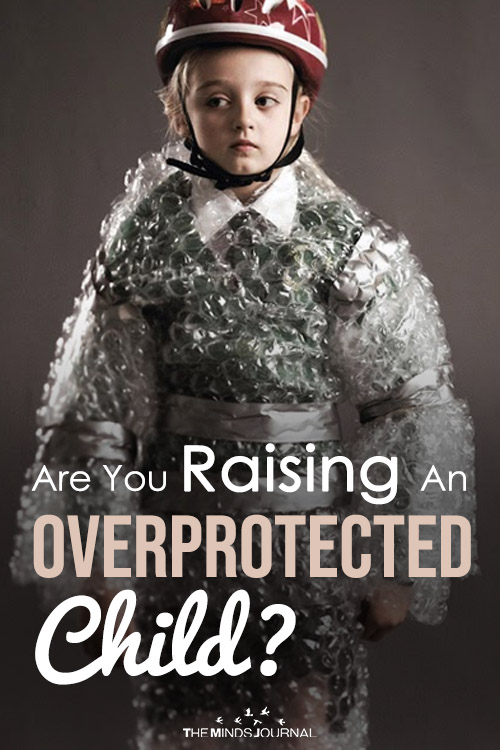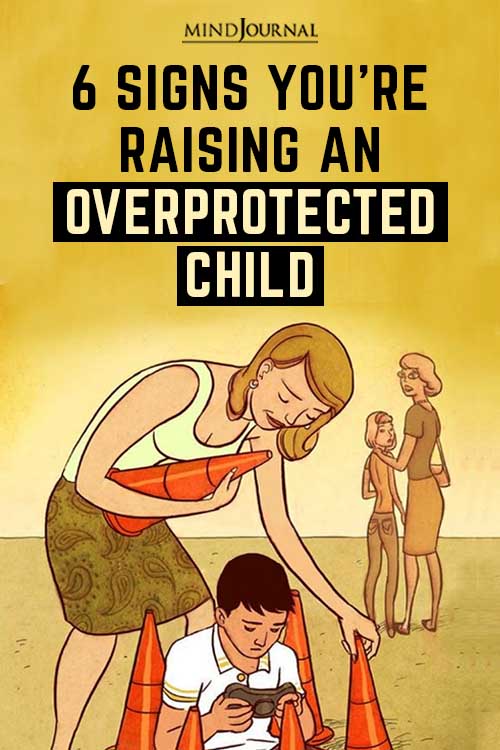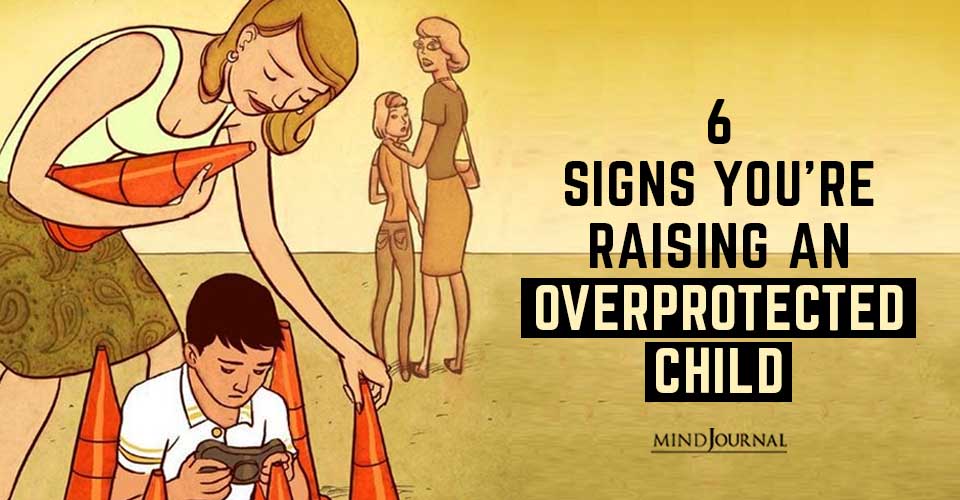When you raise an overprotected child, you are under preparing them to face the world. When you raise an overprotected child, you are sending off the message that they cannot do anything on their own, and that they will always need someone or the other to help and support them.
The first time I met D’s six-year-old, she was absent-mindedly sitting at the window and staring out at a bunch of kids kicking a ball this way and that. I went up to her and asked if she wanted to join the group outside, and she answered with a meek shake of the head before coiling up into a book next to her.
In subsequent conversations, D mentioned she likes the fact that her daughter is quiet and appreciates her seeking permission for almost everything. By the time I was going to come away, I knew what D had on her hands was an overprotected child, who longs to face the world with more fearlessness and yet, is not able to do so.
This is just one instance narrated from personal experience but research has proved that “helicopter parenting” is a real phenomenon. And what it unambiguously leads to is a child who is overdependent, averse to risk-taking, and more prone to becoming an adult incapable of negotiating the world’s many challenges.
The phenomenon arose in the ’80s after the infamous abduction of Adam Walsh, which triggered fear and anxiety in parents. And in 1990, researchers specializing in child development Foster Cline and Jim Fay coined the now oft-cited phrase “helicopter parent”, to describe a parent whose behavior is an antithesis to the behavior that aids independence in a child.
In a recent research study, spearheaded by the University of Minnesota, it was found that children with more overprotective parents tend to struggle a lot more at school, finding it difficult to make friends and becoming prone to “acting out”.
The study assessed 422 children over a period of 10 years – first at age 2, then age 5, and finally at age 10. Unsurprisingly, it was discovered that a child exposed to overprotective parenting at 2 had emotional and behavioral regulation issues at 5. In the study, the researchers found parents prone to overprotectiveness trying to control even the smallest aspect of their child’s behavior, including how to play with a toy and cleaning up post play.
If any of this sounds familiar to you, it might be time to take your own understanding a step further.
Related: 10 Simple Steps to Stop Toxic Parenting
You might be an overprotective parent if some of the following ring a bell.
6 Signs You Are Raising An Overprotected Child
1. Low self-esteem
Does your child find it difficult to speak about what’s on their mind?
Do you sense they are afraid or reluctant to give voice to what they need?
You might be dealing with a lack of self-esteem here and might need to create space to observe your own parenting style. In a 2015 study by Brigham Young University where 400 university students were evaluated, it was found that while an overprotective style of parenting might emerge from good intentions, it was often the one defining cause of risky behavior in young adulthood as well as poor self-worth issues.
Self-esteem is a valuable tool to face the world. It is that one quality that allows us to experiment and experience without continuously having to second-guess or doubt ourselves. And when self-esteem starts young, it not prevents you from raising an overprotected child, it aids their growth in independent as well as community circumstances.
Children who have healthy self-esteem naturally feel accepted and don’t have to try too hard to fit into a group. Similarly, they also have a better sense of boundaries and know when they are being mistreated (as against a child who tries too hard to feel accepted and “good enough”).
To decode this quality and how it develops, we need to examine how it takes shape. Self-esteem is slow to grow since babies and infants are helpless and have to be assisted in almost every way. However, as they become toddlers and then grow up a little more, they also learn new skills, which they then find opportunities to apply and feel efficient about. To foster self-esteem, the parent needs to create an environment of love, trust, and acceptance where the child instinctively experiences non-judgment.
2. Aversion to exploration
Children in their natural state are in that developmental phase where curiosity and a sense of exploration can reap great dividends. If you notice your child is withdrawn or unwilling to explore play with other children his age, you might have to question your own parenting style.
Are you prone to helping your child out with almost every little thing?
Are you scared that they won’t be able to navigate without your intervention?
While your concerns may be valid in certain aspects, a larger overprotectiveness can send out signals that the world in fact is to be feared. A 2012 study (Padilla-Walker, Nelson) concluded that people who had grown up in the care of helicopter parenting, had struggles with self-growth in adulthood since similar exploratory opportunities were missing when they were children.
So what message does overprotective parenting subtly offer to the child?
It can range from “you are helpless” to “you deserve to be treated specially” to “you need to fear the world.” Based on nature and nurture dynamic in a specific parent-child relationship, this can land differently in a non-verbal way.
What goes without saying though is that an aversion to exploration can stem from entitlement, apprehension as well as a sense that the parent is more capable of coming up with solutions. And as you can sense, all of these can become habitual and make life difficult for the child as they grow up.
Related: 6 Damaging Lies We Learn From Narcissistic Parents
3. Random rebellion
As your child grows up, you might notice them increasingly wanting to do exactly the opposite of what you say. While independence might still be an issue with such children, the need still exists to exert an individualistic voice. Rebellion then becomes a coping mechanism and as a parent, you can take the cue to examine how you communicate with your child.
Overprotective parenting is a classic way to ensure a child does not see what reality is all about – they’re either too afraid to take risks or they take so many risks that life becomes chaotic. The risk-taking behavioral phenomenon is seen more as children grow up and venture into the world. The main reason is over-protection can make children feel controlled and stifled, and at some point, the tension shoots through the roof to make way for excessive sensation-seeking.
In research results released in 2015 conducted on people born in the 1940s to assess their behavior up to the present day, it was found that the negative impact of overprotective parenting is comparable to the outcome of a major loss or bereavement (cited by University College London experts). So how could you help a situation of overprotective parenting or overly controlling parenting, especially if you’re the one who has been causing it?
4. Know that mistakes lead to learning
For a parent who suffers from anxiety on behalf of their child (often as a result of their own upbringing) and goes on to protect or control too much, it is a step away from the usual to see why their child needs to make mistakes to learn.
If you’re that parent, it is essential that you create a safe space for your child to play and express themselves, without magnifying each little aspect of their life and setting control over it. That what you may consider a mistake is in fact part of the natural process to rise, fall, tumble, and learn.
5. Examine your own anxieties
Many resources on overprotective and controlling parenting lay stress on behavior changes one needs to make as a parent. However, when you think of it, unless there is an examination of the root cause, is it really possible to bring authentic changes to the way parenting is done?
Before a parent, you’re a human being and you may need to look at what it is in your psyche that leads you to create over-dependency and fear in your child. Consider therapeutic intervention if you feel like it is too much for you to do this alone.
Related: Parenting Challenges In The Digital Age
6. Practice empathy and non-judgment
And when I say this, I don’t just mean towards your child, but also towards yourself. If you’re reading this piece today, it probably means that you’re ready to confront a vital parenting crisis. Just as your child needs space to come into their own, you need some time and reflection to alter the course of parenting you’ve taken so far.
Begin to explore ways of communicating with your child and intervening where necessary, and activate your witnessing side to observe where you might be overdoing it. This can help you tremendously if you don’t your child to be overprotected.
This article is not meant to blame parents and the way they go about this difficult job, but rather to throw light on a subject that in its essence creates fear and anxiety. And if you’re reading this, please know that like a game that has pitfalls and advantages, parenting also comes with its fair share of baggage. Here’s wishing you the best with the changes you’ve been seeking to make.










Leave a Reply
You must be logged in to post a comment.